# Workflow apps verified user access
Verified user access works through runtime user connections and allows each end user to authenticate with their own credentials when using a Workflow app to retrieve or modify information in an external system. This ensures that recipes perform actions using the identity and permissions of the individual user accessing the app.
Verified user actions is compatible with the following types of Workflow app recipes:
- Data population recipes: Ensure that table and drop-down components that use recipes as a data source retrieve only data scoped to the end user's permissions in the external system.
- Component event (Run recipe action) recipes: Ensure actions performed in external apps are scoped to the end user's permissions in that app.
You can also add verified user access to recipe functions invoked by compatible Workflow apps recipes.
# Parent connections
Parent connections act as templates that runtime user connections inherit. The system checks for an existing runtime connection linked to the parent when a user triggers an eligible Workflow apps recipe. Users are prompted to authenticate if no runtime connections are found.
User connections link to the parent connection in Workato when you use verified user access to create connections at runtime. The app invokes a recipe that uses the parent connection when an end-user interacts with a page and triggers a recipe. The app handles runtime user connections in the following ways:
Connection prompt: Workflow apps prompts the user to click Connect if they don't have an established runtime user connection. The Workflow apps recipe executes using this child connection.
No action required: If the user already has an active runtime user connection, Workflow apps recipes execute using the child connection and the pages and components load normally without additional user action.
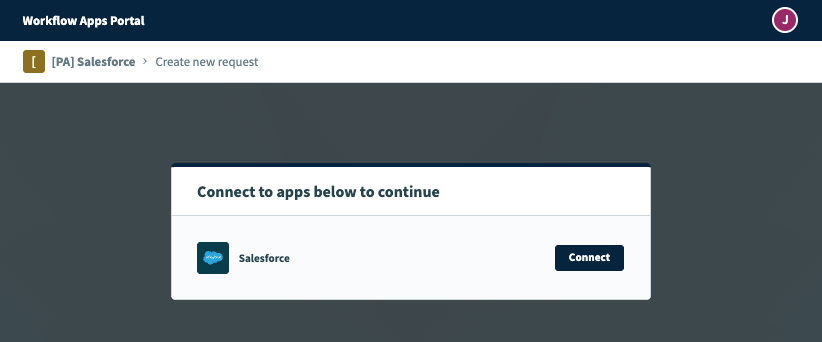 Connect prompt in the Workflow apps portal
Connect prompt in the Workflow apps portal
For example, when you open a Workflow apps page that's configured with page components or run recipe actions that depend on a Salesforce connection that requires verified user access, it creates a child connection for the user. This new connection links to the recipe's default Salesforce connection as its parent.
# App behavior
When recipes configured with verified user access are used in a Workflow apps page, users must authenticate before certain elements load or function. If the app has multiple connections requiring verified user access, users must authenticate to each one.
Data population recipes: Users must authenticate before the following components load:
- Drop-down components (single-select and multi-select) populated with recipe data
- Table components populated with recipe data
Component event recipes: Users must authenticate before the following UI events can trigger recipes:
- Page load
- Button click
- Drop-down value change
- Table row selection
# Add verified user access to Workflow apps recipes
You can add verified user access to eligible Workflow apps recipes during the recipe building process.
Verified user actions is compatible with the following types of Workflow app recipes:
VERIFIED USER ACCESS AUTHENTICATION REQUIREMENTS
Verified user access requires OAuth 2.0 authorization code grant. Other OAuth 2.0 grant types, such as client credentials, password grant, and refresh token grant, are not currently supported.
Complete the following steps to add verified user access to an eligible Workflow apps recipe:
Go to the Workflow apps recipe where you plan to add verified user access.
Click Select an app and action step in the recipe.
Search for and select the app you plan to use. A list of available actions for the app displays.
Select the action you plan to use.
Select the connection type you plan to use for the recipe.
- End user's connection: Workflow apps recipes perform actions based on the identity and permissions of the user who connects to the application. Users authenticate with their own credentials to populate page components with data or view, get, or modify data in an external app.
- This recipe's connection: This option uses the connection established by the recipe builder and follows the same principles as normal app connections.
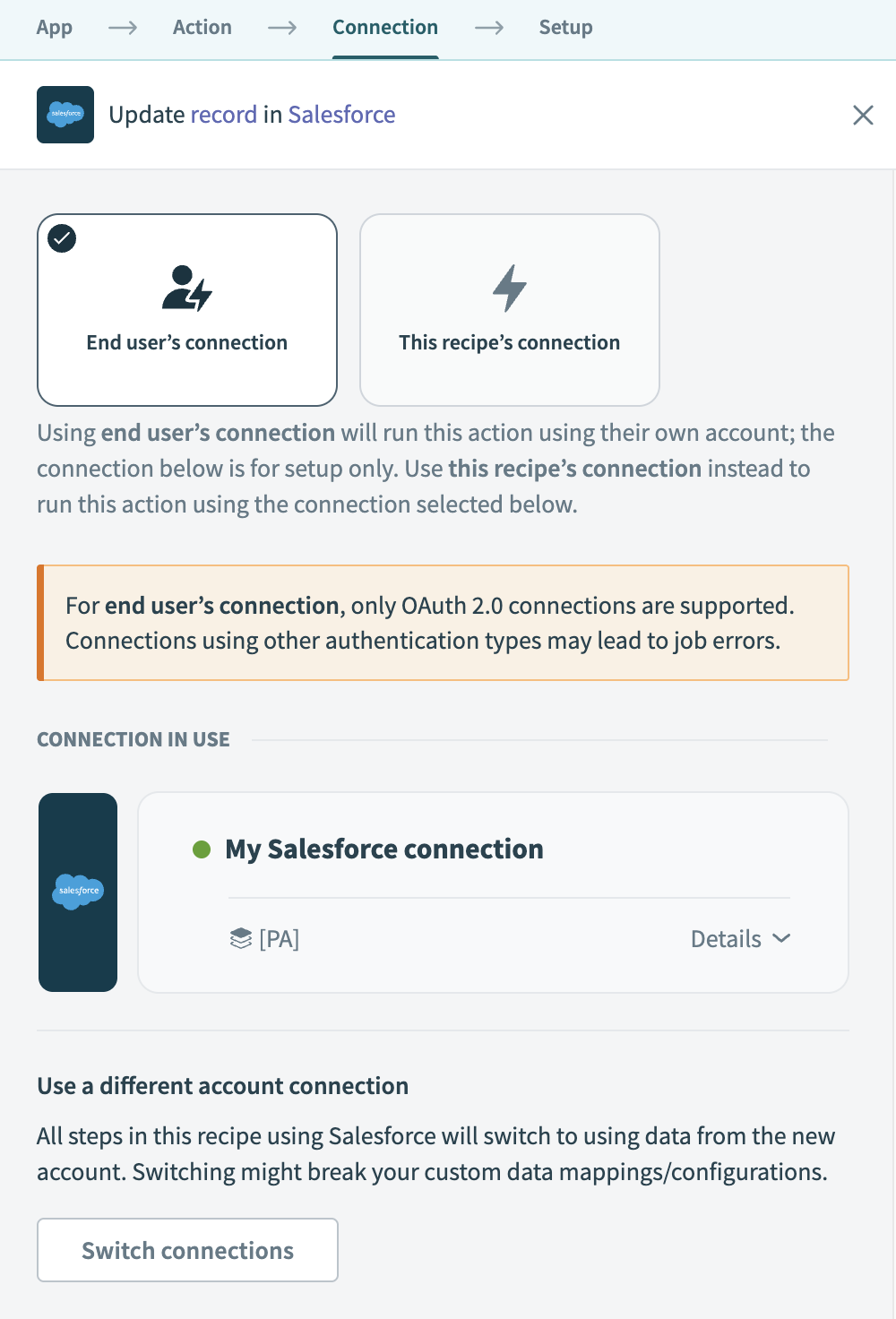 Select User's connection to enable verified user access
Select User's connection to enable verified user access
Select an existing connection or click + New connection to create a new connection.
# Add verified user access to recipe functions
You can configure recipe functions called from Workflow app recipes with verified user access to ensure the recipe function inherits the authenticated user's connection credentials. Add the RecipeOps List connections action to your recipe to retrieve the associated connection ID and pass it to the recipe function.
Complete the following steps to configure verified user access for recipe functions:
Open a Workflow apps recipe configured with verified user access.
Go to the Return data to component action and click + Add step to add a step before this action.
Search for and select RecipeOps by Workato as your app.
Set up your RecipeOps by Workato connection
Complete the following steps to set up your RecipeOps connection:
Click Create > Connection.
Search for and select RecipeOps on the New connection page.
Provide a name for your connection in the Connection name field.
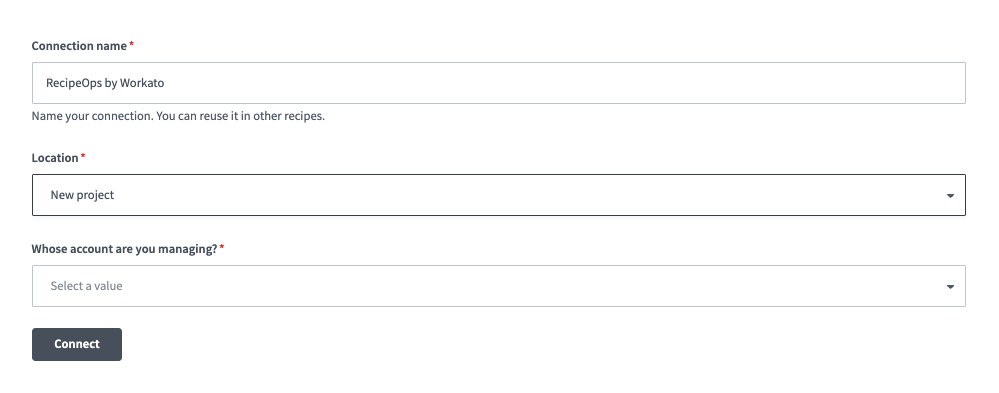 RecipeOps connection setup
RecipeOps connection setup
Use the Location drop-down menu to select the project where you plan to store the connection.
Use the Whose account are you managing? drop-down menu to select My account.
Click Connect.
CONNECTION PRIVILEGES
RecipeOps connections configured to monitor My account have admin privileges and access to all RecipeOps actions and triggers in your workspace, regardless of the role of the user creating the connection.
Select List connections (batch) as the action.
Configure the List connections (batch) action
Complete the following steps to configure the List connections (batch) action:
Use the Parent connection name drop-down menu to select the parent connection name. Alternatively, you can supply the parent connection ID.
Use the Search for child connections drop-down menu to select Yes.
Map the New component event User ID Step 1 datapill to the External ID field.
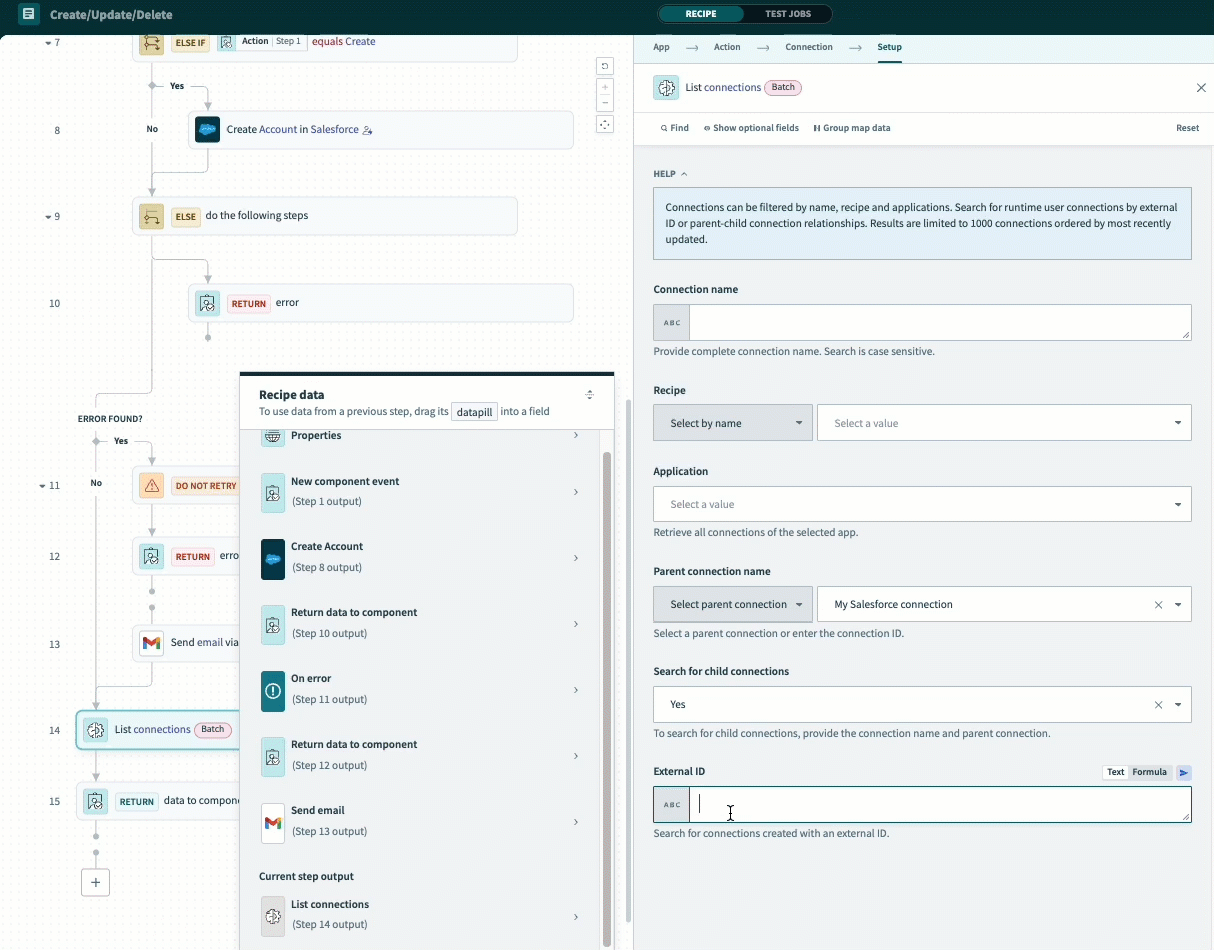 Map the New component event User ID Step 1 datapill to the External ID field
Map the New component event User ID Step 1 datapill to the External ID field
Click + Add step and select Action in app.
Search for and select Recipe function by Workato as your app.
Select Call a recipe function (asynchronous) or Call a recipe function (synchronous) as your action.
Set up your Call a recipe function action
Complete the following steps to set up your Call a recipe function action:
Use the Recipe function drop-down to select the recipe function you plan to call.
Go to Connection overrides and map in the List connections Connection ID Step 14 datapill.
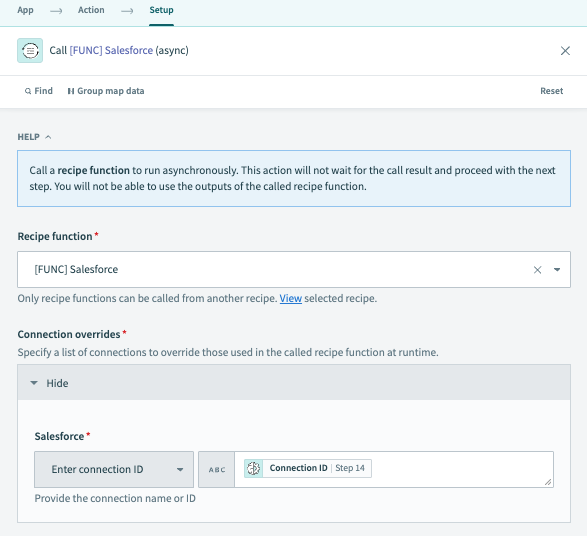 Map in the List connections Connection ID Step 14 datapill
Map in the List connections Connection ID Step 14 datapill
Click Save and Exit.
Open the recipe function that your recipe calls.
Select the Action in an app that you plan to use with verified user access.
Go to the Connection tab and ensure the app is configured to use the Calling recipe's connection.
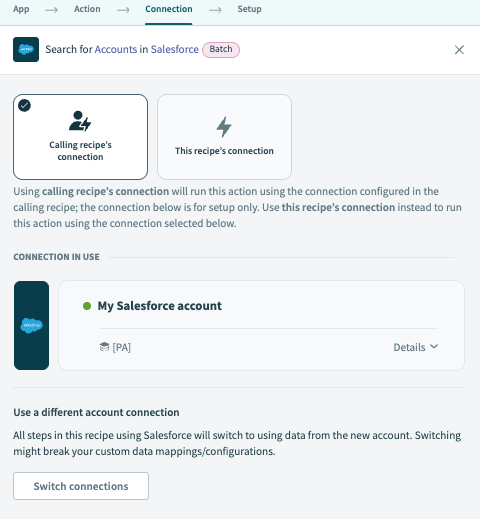 Ensure the app connection uses the Calling recipe's connection
Ensure the app connection uses the Calling recipe's connection
Click Save.
# Manage personal connections
You can manage personal connections are managed in the following places:
- Workato: Builders can manage runtime user connections by going to Tools > Runtime user connections. This page lists all connections created at runtime. Users must have the View Verified user access at runtime privilege to access this page.
- Workflow apps portal: End users can manage their personal connections in the Workflow apps portal in the Connections section of their profile settings.
# Manage personal connections in the Workflow apps portal
Workflow apps users can manage their personal connections in the Workflow apps portal:
# View personal connections
Complete the following steps to view personal connections in the Workflow apps portal:
Sign in to the Workflow apps portal.
Click your profile icon and select Manage your account.
Click Connections.
View active and disconnected personal connections.
 View personal connections
View personal connections
# Delete personal connections
Complete the following steps to delete personal connections in the Workflow apps portal:
Sign in to the Workflow apps portal.
Click your profile icon and select Manage your account.
Click Connections.
Click the ... (ellipses) next to the connection you plan to delete.
Click Delete.
 Delete a personal connection
Delete a personal connection
Last updated: 2/5/2026, 4:12:34 PM